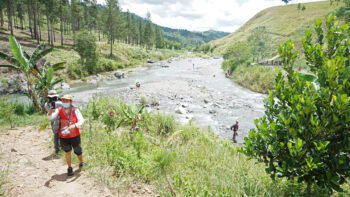GENERAL SANTOS CITY (MindaNews/30 August) – Close to a thousand tuna industry workers in this city who had lost their jobs due to the impact of the two-year fishing ban in the high seas off the Western and Central Pacific Ocean have so far received P3.629 million worth of assistance from the Department of Labor and Employment (DOLE).
Lawyer Ma. Gloria Tango, DOLE Region 12 director, said Monday at least 957 displaced workers from eight companies under the local tuna fishing and processing sectors have already availed of various livelihood packages and other related assistance offered by the agency
since the fishing ban started last January 1.
She said they provided livelihood or small business starter kits, emergency employment and free basic safety training to the workers and included their dependents in the Kabataan Information Technology Opportunities program.
Last week, Tango said they released additional livelihood or Kabuhayan starter kits to 142 workers who were directly affected by the tuna fishing ban.
She said the livelihood packages, which were worth P5,000 each, included bicycles for balut vending as well as basic equipment and supplies for carenderia or small eateries, massage therapy and dressmaking businesses.
Tango said they released the packages following the approval of the project proposals that were earlier submitted by the beneficiaries to DOLE-12.
“We’ve been encouraging the affected workers to go into small business ventures so they will have alternative livelihood sources during the duration of the fishing ban and even beyond,” she said.
The release of the livelihood packages was part of the agency’s approved action program for displaced tuna industry workers from this city as a result of the Pacific fishing ban imposed by the Western and Central Pacific Fisheries Commission (WCPFC).
The WCPFC was established by the Convention for the Conservation and Management of Highly Migratory Fish Stocks in the Western and Central Pacific Ocean that came into force in 2004 and to which the Philippines is a party.
The commission imposed the fishing ban on all of its 25-member countries and 10 other observer-states as a result of scientific studies and the emergence of statistics that showed the drastic decline of tuna fish stocks, especially bigeye and yellowfin tuna.
Local tuna fishing companies estimated a drop of 10 to 30 percent in tuna catches this year as a result of the fishing ban.
Tango said that based on their consultations with members of the Socsksargen Federation of Fishing and Allied Industries Inc. (SFFAAII), at least 16 tuna fishing and processing firms operating in the city were already affected by the ban.
She said their records showed that some 805 workers were displaced during the first half of the year and an additional 691 as of last July or a total of 1,496 workers.
Tango said at least seven companies have already availed of the livelihood kits and three for the emergency employment program.
Under the emergency employment scheme, DOLE-12 provided a stipend worth 60 percent of the prevailing daily minimum wage to workers of affected companies for a 30-day subsidized work program. The company shouldered the 40 percent of the workers’ daily pay, which is currently set at P245.
She said they also offered free training on Survival of Life at Sea or SOLAS through the National Maritime Polytechnic in Tacloban City.
“SOLAS training is a requirement set by the Maritime Industry Authority for workers of tuna fishing vessels. Some of them requested for it in preparation for the resumption of the fishing operations when the ban later ends,” she added. (Allen V. Estabillo/MindaNews)







